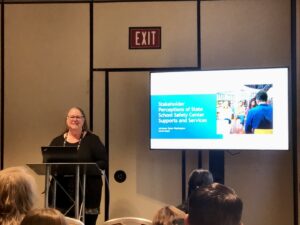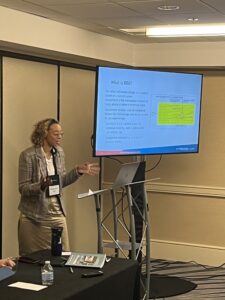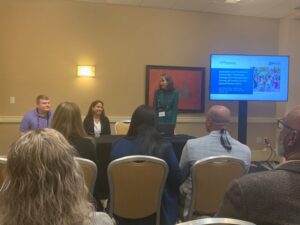One of the leading conferences for criminology and justice researchers is the American Society of Criminology (ASC) Annual Meeting. The JPRC was an active participant at ASC’s most recent Annual Meeting, which was held in November 2023 in Philadelphia. Our team gave presentations on four different panels and also contributed to the poster session. Many of the JPRC team members also came together for a reception and several meals together.

The JPRC and the Texas State University School Safety Center are collaborating on a National Institute of Justice (NIJ)–funded study of Behavioral Threat Assessment in Texas. Their panel presented implementation and early outcome findings from the project. Pictured are Trent Baskerville, Trevor Fronius (Principal Investigator), Sarah Guckenburg, and Alexis Stern.

In another NIJ-funded study, the JPRC is working to better understand State School Safety Centers (SSSCs). SSSCs have been implemented by states to more effectively assist educational communities to prevent and respond to school safety concerns. Centers largely do this through training, technical assistance, and resources. Our WestEd colleague, Adrienne Quinn Washington, presented on one component of the JPRC’s study, which involved surveying and interviewing school leaders about their perceptions of the SSSC in their state.

The JPRC received internal funding, known as a Strategic Investment Framework project, to better understand and document the use of regression discontinuity design, a rigorous quasi-experimental design, in crime and justice settings, and to promote its use whenever appropriate to strengthen casual inference in justice evaluations. WestEd teammate Alexis Grant presented early results from this project.

Our team is collaborating with Family Services of Montgomery County (FSMC) in Pennsylvania on an evaluation of a reentry program, funded by the Bureau of Justice Assistance. The JPRC’s Sarah Guckenburg (standing) joined a presentation with FMSC’s Alissa McBride and Michael Lees (seated), who shared their perspectives on the collaborative evaluation, and how data are collected and used.

An important development in recent years is to intentionally include the voice of persons with lived experience in research and evaluation studies. This is at the heart, for example, of strategies like equitable evaluation. Our JPRC team presented a poster at ASC to highlight our research with justice-involved juveniles and practitioners who serve them, to intentionally incorporate their voice in the JPRC’s future research agenda in juvenile justice.

Our JPRC team has now grown to 25 persons, across 12 states. Nearly all of us work remotely. Thanks to support from WestEd, many of our team were able to attend ASC, gather for a formal reception and dinner, and meet for meals more informally throughout the meeting (for example, nine of us met for dinner at a local restaurant: Danielle Munguia, Sarah Guckenburg, Curtis Herring, Ashley Boal, Anthony Petrosino, Alexis Grant, Trent Baskerville, Ericka Munoz, and Trevor Fronius pictured).
